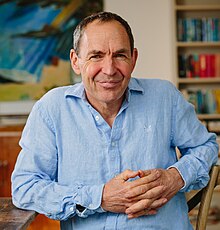
Mike Berners-Lee is an English researcher and writer on carbon footprinting. He is a professor and fellow of the Institute for Social Futures at Lancaster University and director and principal consultant of Small World Consulting, based in the Lancaster Environment Centre at the university. His books include How Bad are Bananas?, The Burning Question and There Is No Planet B and he is a contributing author to The Climate Book created by Greta Thunberg. He is considered an expert on carbon footprints.
Early life and education
He was born in 1964 and is the son of Mary Lee Woods and Conway Berners-Lee who were both mathematicians and computer scientists. One of his brothers is computer scientist Sir Tim Berners-Lee who invented the World Wide Web.
He graduated in physics from University of Oxford in 1986, gained a PGCE in Physics and Outdoor Education at Bangor University in 1988, and has a master's in Organisation Development and Consulting from Sheffield Hallam University (2001). He has been a Professor in Practice at Lancaster University since 2016.
Carbon accounting
Berners-Lee has pioneered carbon accounting of upstream carbon emissions from supply chains, known as scope 3 emissions, to assess the full greenhouse gas emissions of products. His work at Small World Consulting has combined Process-based Life Cycle Analysis with Environmentally Extended Input-Output Analysis to achieve both a system-complete estimate of the supply chain and specificity in key areas. He is also a leading researcher in assessing the full climate impacts of current and emerging ICT.
Climate impact of food and land-use
His research has also examined the climate emissions from food and land-use, concluding that global food production can meet humanity's nutritional needs but only with a radical shift in dietary choices, so that less land is used for the relatively inefficient production of animal products with high greenhouse gas emissions, and more land is used to produce plant-based foods direct for human consumption.
Selected publications
- Berners-Lee, Mike (2022). "How to Buy". In Thunberg, Greta (ed.). The Climate Book. Allen Lane. ISBN 978-0-241-54747-2.
- Berners-Lee, Mike (2010). How Bad Are Bananas? The Carbon Footprint of Everything. Profile. ISBN 9781846688911.
- Second edition: Berners-Lee, Mike (2020). How bad are bananas? : the carbon footprint of everything (New ed.). London: Profile Books. ISBN 9781788163811.
- "Updated North American" edition: Berners-Lee, Mike (2022). The carbon footprint of everything. Vancouver: Greystone Books. ISBN 9781771645768.
- Berners-Lee, Mike (2024) Peut-On Encore Manger des Bananes? (in French) Translated by Bertrand Guillot (1 ed) France. ISBN 9789998772403
- Berners-Lee, Mike; Clark, Duncan (2013). The Burning Question: We Can't Burn Half the World's Oil, Coal and Gas. So How Do We Quit?. Profile. ISBN 9781781250457.
- Berners-Lee, Mike (2019). There Is No Planet B: A Handbook for the Make or Break Years. Cambridge UP. ISBN 9781108545969.
Media appearances
- Climate Change - The Facts. First aired on 18 April 2019, BBC One
- Horizon - Feast to Save the Planet. First aired 4 January 2021, BBC Two
- Six Inches of Soil. First screened in UK 4 January 2024.
Memberships
- 2016 - present: Centre for Social Futures, Lancaster University
- 2024 - present: Carbon Accounting Alliance
References
- "Our people". Lancaster Environment Centre. Lancaster University. Retrieved 4 April 2024.
- "The Team". Small World Consulting. Retrieved 21 March 2024.
- "How Bad Are Bananas? The Carbon Footprint of Everything". Publishers Weekly. Retrieved 1 January 2019.
- Couch, Aaron (13 June 2011). "How Bad are Bananas (review)". Christian Science Monitor. Retrieved 1 January 2019.
- Forbes, Peter (31 May 2013). "The Burning Question by Mike Berners-Lee and Duncan Clark – review". The Guardian. Retrieved 8 February 2021.
- "There Is No Planet B, by Mike Berners-Lee". www.ft.com. Retrieved 4 April 2024.
- "A bad reputation". BBC News: Magazine. 8 June 2010. Retrieved 1 January 2019.
- "Author – and brother of world wide web inventor – to talk about threat of carbon emissions". Berkhamsted and Tring Gazette. 21 September 2014. Retrieved 1 January 2019.
- "Mike Berners-Lee". Chartwell Speakers. Retrieved 15 June 2022.
- Kennelly, C.; Berners-Lee, M.; Hewitt, C.N. (2019). "Hybrid life-cycle assessment for robust, best-practice carbon accounting". Journal of Cleaner Production. 208: 35–43. Bibcode:2019JCPro.208...35K. doi:10.1016/j.jclepro.2018.09.231.
- Freitag, Charlotte; Berners-Lee, Mike; Widdicks, Kelly; Knowles, Bran; Blair, Gordon S.; Friday, Adrian (2021). "The real climate and transformative impact of ICT: A critique of estimates, trends, and regulations". Patterns. 2 (9): 100340. doi:10.1016/j.patter.2021.100340. PMC 8441580. PMID 34553177.
- Berners-Lee, M.; Hoolohan, C.; Cammack, H.; Hewitt, C.N. (2012). "The relative greenhouse gas impacts of realistic dietary choices". Energy Policy. 43: 184–190. Bibcode:2012EnPol..43..184B. doi:10.1016/j.enpol.2011.12.054.
- Berners-Lee, M.; Kennelly, C.; Watson, R.; Hewitt, C. N. (2018). Kapuscinski, Anne R.; Locke, Kim A.; Peters, Christian J. (eds.). "Current global food production is sufficient to meet human nutritional needs in 2050 provided there is radical societal adaptation". Elementa: Science of the Anthropocene. 6: 52. Bibcode:2018EleSA...6...52B. doi:10.1525/elementa.310. ISSN 2325-1026.
- "BBC One - Climate Change - The Facts". BBC. Retrieved 8 April 2024.
- "BBC Two - Horizon, 2021, Feast to Save the Planet". BBC. Retrieved 8 April 2024.
- Ramsay, Colin (4 January 2024), Six Inches of Soil (Documentary), David Morrissey, Adrienne Gordon, Anna Jackson, DragonLight Films, Springtail Productions, retrieved 8 April 2024
External links
- Burning Question website
- "Climate change and carbon footprinting — an interview with Mike Berners-Lee". Croner-i. Retrieved 1 January 2019.
| Lancaster University | ||
|---|---|---|
| Colleges |  | |
| People |
| |
| Buildings | ||
| Departments | ||
| Student life | ||
| Symbols | ||